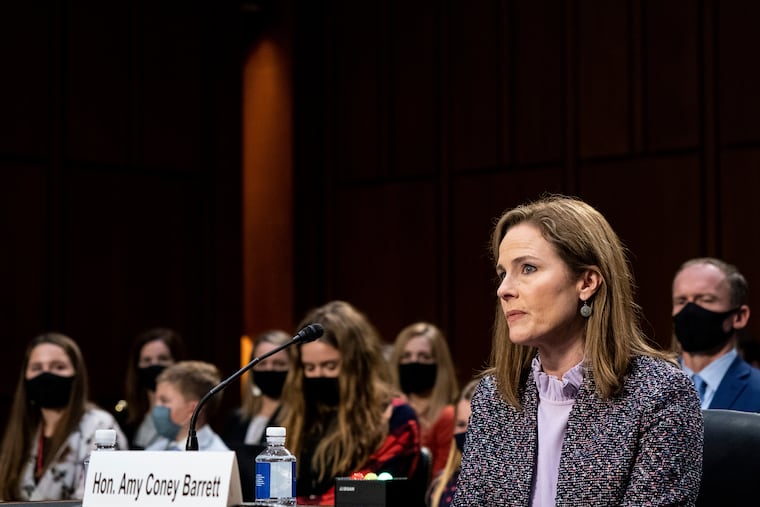The tiny punctuation mark that should scare Amy Coney Barrett’s critics | The Angry Grammarian
The hyphen — or its omission — is a potent weapon.

Is it ever OK to make a religious attack? What about a faith-based one?
Is it ever OK for a Supreme Court justice to make a religious ruling? What about a faith-based one?
And why do these intimately related terms have such different impacts?
Amid the race to confirm Amy Coney Barrett as the next Supreme Court justice, that one little hyphen in faith-based is causing an intricate dance among Senate Democrats and Republicans, with each side eager to paint the other as intolerant. And the hyphen — or its omission — is a potent weapon.
» READ MORE: Supreme Court nominee Amy Coney Barrett refuses to commit to a recusal from election disputes
No one wants to be accused of making a religious attack. That probably explains why, in the first day of Barrett’s Judiciary Committee hearings on Monday, Senate Republicans used the words religious and religion 48 times when describing Democrats’ opposition to her nomination. In contrast, one Senate Democrat used one of those words one time: Delaware Sen. Chris Coons, and he was quoting Republican Sen. Ben Sasse.
On the other hand, saying someone’s jurisprudence is religious sounds a lot like a scary leap toward theocracy. That’s why not a single one of those 48 mentions made any reference to Barrett’s legal decisions. For those, a more clinical term is needed.
Enter the hyphen.
The term faith-based, seldom used outside of the United States, dates to the 19th century. But its usage was negligible until the late 1990s, when its prevalence skyrocketed after the 1996 welfare overhaul included tucked-away provisions allowing government dollars to flow to religious organizations. In 2001, George W. Bush, who knew something about making palatable the mixing of government and religion, established the White House Office of Faith-Based and Community Initiatives, and Barack Obama expanded it. Donald Trump — who likes saying the quiet part out loud, and also doesn’t understand what hyphens are — replaced that office with the White House Faith and Opportunity Initiative. No hyphenation necessary.
It’s true that hyphens are complicated. Brits and Americans follow different hyphenation rules, and those rules change with maddening frequency. For example, it was just last year that the Associated Press decided that African American no longer warrants a hyphen. Hyphens are added punctuation that can slow down a reader and make a term seem a smidge more technical.
But that complication is useful to those defending Barrett’s judicial philosophy. Myriad news outlets have referred to her “faith-based” approach to the law, her associations with “faith-based” organizations, or her “faith-based” beliefs. Defenders can claim that her decisions aren’t theocratic, while critics can more subtly cite the influence that her religion could have on her legal decisions.
That hyphen has a particular local significance. After a 2018 Inquirer story by Julia Terruso revealed that two religious foster agencies were violating city nondiscrimination ordinances by refusing to place children with same-sex couples, the city terminated its foster-care contract with Catholic Social Services, which wouldn’t change its policy. CSS sued, and the case is headed all the way to the Supreme Court, where the agency’s petition referred three times to “faith-based” agencies like Catholic Social Services.
The Supreme Court is scheduled to hear that case on Nov. 4, the day after the election. It would be one of the first arguments heard by a Justice Amy Coney Barrett.
If a Supreme Court with a “faith-based” legal doctrine decides that government dollars can fund an openly discriminatory religious agency, and that agency can hide behind the hyphen of “faith-based,” we should all be scared of what punctuation can do.
The Angry Grammarian, otherwise known as Jeffrey Barg, looks at how language, grammar, and punctuation shape our world, and appears biweekly. Send comments, questions, and em dashes to jeff@theangrygrammarian.com.